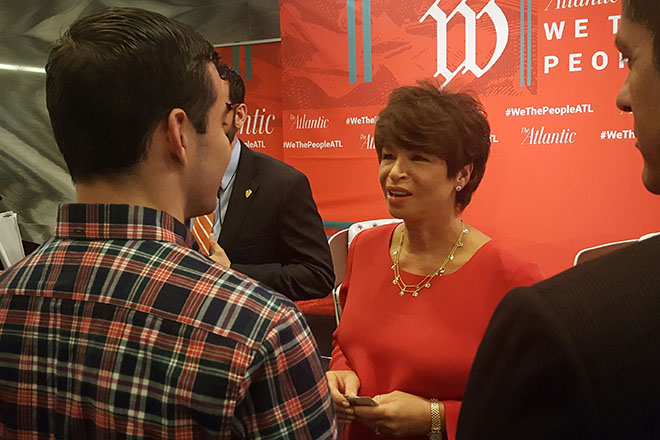WASHINGTON – The woman who is closer to President Barack Obama than any other White House official has met with and praised the Koch brothers, the conservative billionaires who funded the Tea Party and publicly feuded with the president.
Senior Advisor Valerie Jarrett explained why Tuesday as she touted the Obama administration’s work to build a bipartisan consensus around criminal justice reform, even as that consensus has failed of late to turn ideas into policy.
Jarrett, a longtime confidant of Obama’s from Chicago who led White House’s task forces on student sexual assault and empowerment for girls, said that the administration has to find partners in difficult places to succeed.
“You can’t form relationships if you are so convinced that compromise and conversation is an existential threat and the president has never thought that way,” Jarrett said.
Criminal justice reform has gained some strong GOP allies in Congress, including House Speaker Paul Ryan. But with some Republicans wary of appearing soft on crime, Ryan has struggled to gather a consensus. Sen. Corey Booker D-N.J., said earlier this month that a bill he co-sponsored with Sen. Chuck Grassley R-Iowa to reduce mandatory minimum sentences had little chance of passing this Congress.
The U.S spends $80 billion per year to incarcerate approximately 2.2 million people, according to the Brookings Institution and the Bureau of Justice statistics, turning the justice system into a fiscal and human rights crisis in the eyes of many lawmakers.
Jarrett singled out mandatory minimums as a major policy that needed reform. Instituted federally and in most states during the 1990s crime wave, they mandate minimum sentences for designated offenses, often drug crimes. Ryan is actively pushing to reform them and Obama has commuted more sentences than the last 11 presidents combined, many of them sentences handed down under mandatory minimums.
These measures have wide support among criminal justice advocates. Judge George Timberlake, chair of the Illinois Juvenile Justice commission, said minimums lead to more crime by not allowing judges to properly handle each case.
“We treat everybody the same, you know it seems we’ve created the same result – same problem – with those individuals,” Timberlake said. “And that is further criminality.”
Jarrett also called for juvenile justice reform, a policy that has more momentum. Last Thursday, the House passed a bill that would update the Juvenile Justice Delinquency and Prevention Act. The bill would deter states from holding minors in adult prisons and prevent states from incarcerating minors for so-called status offenses like missing school or a curfew.
Yet a similar bill with bipartisan support in the Senate has been held up since Sen. Tom Cotton R-Ark. raised concerns about the status offenders provision in February. After the House vote, Grassley and Sen. Sheldon Whitehouse D-R.I., sponsors of the Senate bill, released a statement calling for the Senate to act.
With Congress stalled on reform, the administration created an initiative to help former inmates find jobs by asking employers to stop asking about criminal records in initial job applications. Since Obama started the Fair Chance Initiative last November, more than 100 organizations from Best Buy to the SUNY education system have signed on.
“I think we’re past the tipping point now,” Jarrett said on hiring former inmates. “People realize we’re leaving talent on the sideline by arbitrarily saying we’re not going to hire people.”

